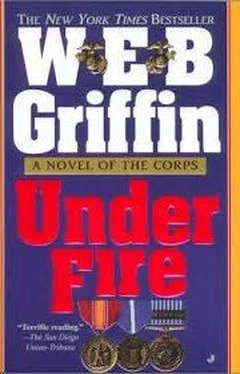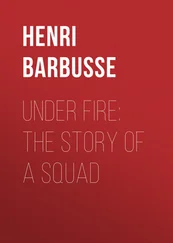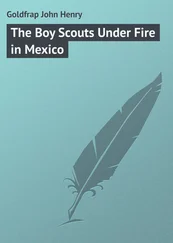Griffin W.E.B. - The Corps 09 - Under Fire
Здесь есть возможность читать онлайн «Griffin W.E.B. - The Corps 09 - Under Fire» весь текст электронной книги совершенно бесплатно (целиком полную версию без сокращений). В некоторых случаях можно слушать аудио, скачать через торрент в формате fb2 и присутствует краткое содержание. Год выпуска: 0101, Жанр: Старинная литература, на английском языке. Описание произведения, (предисловие) а так же отзывы посетителей доступны на портале библиотеки ЛибКат.
- Название:The Corps 09 - Under Fire
- Автор:
- Жанр:
- Год:0101
- ISBN:нет данных
- Рейтинг книги:5 / 5. Голосов: 1
-
Избранное:Добавить в избранное
- Отзывы:
-
Ваша оценка:
- 100
- 1
- 2
- 3
- 4
- 5
The Corps 09 - Under Fire: краткое содержание, описание и аннотация
Предлагаем к чтению аннотацию, описание, краткое содержание или предисловие (зависит от того, что написал сам автор книги «The Corps 09 - Under Fire»). Если вы не нашли необходимую информацию о книге — напишите в комментариях, мы постараемся отыскать её.
The Corps 09 - Under Fire — читать онлайн бесплатно полную книгу (весь текст) целиком
Ниже представлен текст книги, разбитый по страницам. Система сохранения места последней прочитанной страницы, позволяет с удобством читать онлайн бесплатно книгу «The Corps 09 - Under Fire», без необходимости каждый раз заново искать на чём Вы остановились. Поставьте закладку, и сможете в любой момент перейти на страницу, на которой закончили чтение.
Интервал:
Закладка:
"If you say so," he went on. "And I used to look at the damn thing all the time. It fascinated me. Little did that lit-tle boy know that one day he would get to ride on a real junk in the Yellow Sea-"
"Maybe you are human after all," she said.
"-with a crazy lady who's likely to get herself killed, like the cat, from curiosity."
"I'm just trying to do my job," she said.
"Your job is interfering with me doing mine," he said. "When I stand up in a couple of minutes, you stay where you are until I tell you you can move. If you stand up, I'm going to knock you down. Got it?"
"That, I think you mean," she said. "Okay."
A minute later, McCoy gingerly raised his head alongside a stanchion, took a quick look, and dropped quickly back down.
"Remember the cat," Jeanette said. "What did you see?"
"We're fifty yards, maybe a little more, from the wharf. Aside from a couple of hungry-looking dogs on shore, I didn't see any sign of life at all."
Korean seamen lowered all but one sail.
McCoy waited for Taylor to start the engine, in case they had to make a quick exit.
And waited.
And waited.
"What?" Jeanette asked.
"Taylor said he was going to start the engine," McCoy said.
He looked down the deck to Major Kim, who met his glance, then shrugged and held both hands, palms up and out. The message was clear: I don't see anything.
McCoy stood up, as the Wind of Good Fortune scraped against the stone wharf.
Aside from the dogs, who had come from the shore out onto the wharf in curiosity, there was still no sign of life.
"Kim, get your men over the side, get us tied up," Mc-Coy ordered in Korean, and then switched to English. "Ernie, send four men down the wharf to see what they can see in the village."
Zimmerman came out of the passageway under the stern in a crouch, carrying his Thompson. He laid it on the deck and tossed a rope ladder over the side. By the time he had done that, two Marines, one armed with a Browning auto-matic rifle, the other with a Garand, came out of the pas-sageway and knelt behind the rail, training their weapons on the wharf.
Zimmerman, his Thompson slung over his back, started down the ladder and passed from sight. Sergeant Jennings, also with a Thompson, came out of the passageway and immediately went down the ladder. The Marine with the M-l then slung it over his back and went over the side. He was followed by the Marine with the BAR, who chose to toss his weapon over the side to one of the Marines on the wharf before getting on the ladder.
McCoy was pleased with the way that had gone. Not only did the Marines who had been recruited from the brigade seem to know what they were doing, but they were halfway down the wharf before Kim's national policemen managed to get the Wind of Good Fortune tied up to the pier.
"Can I stand up now?" Jeanette asked.
"In a minute," McCoy answered.
An elderly Korean man came out of one of the thatch-roofed stone houses as the Marines reached the shore. Zimmerman motioned for two of the Marines following him to go around him and into the houses nearest to the wharf.
Moments later, they came out of the houses, one of them making a thumbs-up gesture.
"Okay, you can stand up," McCoy said, slung his Garand over his back, and started down the ladder.
When he was on the wharf, and had turned toward the houses, he saw Major Kim, armed with a carbine, trotting down it, almost at the shore. One of his national policemen was right behind him, and as McCoy trotted toward shore, another ran past him.
Kim introduced the old man to McCoy as the village chief, and McCoy as the officer commanding. The old man didn't seem at all surprised that McCoy spoke Korean.
The old man told them that no North Koreans had been to Tokchok-kundo since Kim had last been there, and that he had seen no indication that the small garrisons on Taemuui-do and Yonghung-do had been reinforced with ei-ther men or heavier weapons.
"Okay, Ernie," McCoy ordered, "let's get the stuff off the boat."
The old man turned suddenly and walked, or trotted, as fast as he could on his stilted shoes toward the houses, and went inside first one of them, and then two others. Immedi-ately, people, men, women, and children, came out of the house and started down the wharf toward the Wind of Good Fortune, obviously to help carry whatever the Wind of Good Fortune held ashore. Then he came back to McCoy, Kim, and Zimmerman.
"Do you speak English?" McCoy asked, surprised.
The old man looked at him without comprehension.
"You were speaking Korean," Major Kim said, with a smile.
McCoy saw Jeanette kneeling on the wharf, taking pic-tures of the Koreans.
I didn't tell her she could come ashore, just that she could stand up. But I should have known what she would do.
"First priority, Ernie, is to get the SCR-300 on the air."
Major Kim asked the old man if the generator was run-ning, and where it was.
The generator was running, or would be, if there was fuel. And he pointed to a small stone, thatch-roofed build-ing. McCoy saw that there was a small electrical network coming out of it, with one wire leading to several of the houses and another leading out to the wharf.
McCoy walked to the building and went inside, with Kim following him. There was a small, diesel-powered generator. McCoy saw that it had been made in Germany. And there was room to set up the SCR-300, and he said so.
"I'll have them bring it here," Kim said.
"And then I think we should see if the mayor can see anything on the aerial photos we may have missed," Mc-Coy said. "And see about finding someplace my people can stay. I don't like the idea of them being at the water's edge-too easy to see if somebody comes calling."
"There's several houses up the hill," Kim said.
"Let's have a look at those. We can have the mayor look at the photos there."
The houses on the hill had two advantages. They were within range of the Marines' weapons should the North Koreans decide to have a look at Tokchok-kundo, but they were far enough away so that Marines wearing Korean clothing could probably pass for Koreans.
And one disadvantage. They had been placed where they were to facilitate the drying of fish on racks fastened to their thatched roofs.
What the hell, after a day, they'll probably not even no-tice the smell.
The houses were made of stone, basically round struc-tures, with small rooms with straight walls leading off them. In the center structure were platforms apparently used as beds against the outer wall. There was a place for a fire in the middle, apparently used both for cooking and to heat the floors and the platforms in winter. They were at once simple and sophisticated.
McCoy had been in similar huts on the mainland during the winter, and had never been able to figure out how the heating system worked.
A bare lightbulb-one of three strung over the plat-forms-glowed red for a moment and then shone brightly, signaling that the generator was now up and running. Mc-Coy laid out the aerial photographs on the platform, and told the old man he would be grateful if he would look at them.
Surprising McCoy not at all, the war correspondent of the Chicago Tribune came into the house as the old man was looking at the aerial photographs.
"Is this where I get to stay?" she asked.
"Probably," McCoy said. "Every maiden's prayer-the only girl sharing a seaside cottage with four handsome and virile Marines."
"What are you doing?" she asked, annoyed.
"These are aerial pictures of Taemuui-do and Yonghung-do," he said. "The islands we're going to have to take."
As she bent over them for a look, Zimmerman, Taylor, and Staff Sergeant Worley, the radio operator, a small, slim man in his late thirties, came into the house. All three were sweating.
Читать дальшеИнтервал:
Закладка:
Похожие книги на «The Corps 09 - Under Fire»
Представляем Вашему вниманию похожие книги на «The Corps 09 - Under Fire» списком для выбора. Мы отобрали схожую по названию и смыслу литературу в надежде предоставить читателям больше вариантов отыскать новые, интересные, ещё непрочитанные произведения.
Обсуждение, отзывы о книге «The Corps 09 - Under Fire» и просто собственные мнения читателей. Оставьте ваши комментарии, напишите, что Вы думаете о произведении, его смысле или главных героях. Укажите что конкретно понравилось, а что нет, и почему Вы так считаете.










